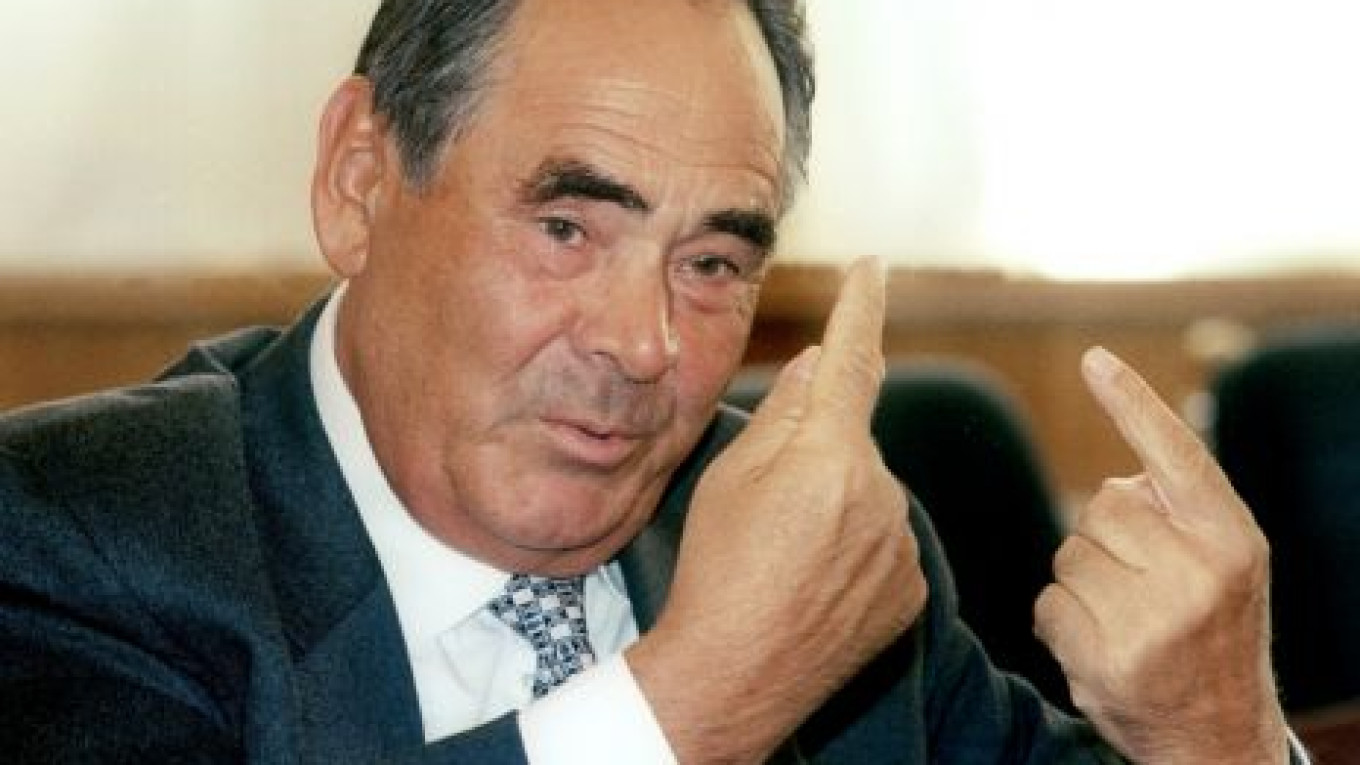The replacement of the deeply entrenched Shaimiyev, 73, when his fourth term expires in March comes weeks after President Dmitry Medvedev replaced Sverdlovsk's long-serving governor Eduard Rossel, 72, and it raises new questions about the future of two other veteran regional bosses, Moscow Mayor Yury Luzhkov, 73, and Bashkortostan President Murtaza Rakhimov, 75.
Shaimiyev asked Medvedev after a State Council meeting Friday not to appoint him to a new term as president after his current mandate expires March 25, the Kremlin said on its web site. The meeting was held at Shaimiyev's request, it said.
Shaimiyev explained that he supported Medvedev's call in his state-of-the-nation address Nov. 12 for a new generation of leaders to step in, the Kremlin said.
Medvedev also said last month that veteran leaders should not serve more than three terms.
Shaimiyev said he recommended that he be replaced with Tatarstan's prime minister, Rustam Minnikhanov, 52.
Minnikhanov was among the three names that United Russia, the ruling party in Tatarstan's legislature, put on a list of candidates to head the predominantly Muslim republic and submitted to Medvedev for his consideration last month. The other two names were Shaimiyev and the speaker of Tatarstan's legislature, Farid Mukhametshin.
Medvedev gave no indication about whether he would support Minnikhanov's candidacy.
Shaimiyev has been the first and only leader of oil-rich Tatarstan since the Soviet collapse in 1991. But he was a political heavyweight even before that, heading the republic's parliament in Soviet times.
Despite his background as a Soviet apparatchik and a leading member of United Russia, Shaimiyev has often spoken critically of the current political system and has denounced the abolishment of gubernatorial elections in 2004.
The handover of power promises to be smooth in Tatarstan because Shaimiyev announced his intention to leave on his own without evidence of pressure from the Kremlin, said Alexei Titkov, an analyst at the Institute of Regional Politics.
"It doesn't look like a real shift of power," he added. "Shaimiyev has built up a strong system that will likely be followed by his successor."
He noted that Shaimiyev is well past 70, the age when regional leaders usually retire. "It's common practice for governors not to stay in office after 70," Titkov said.
But two powerful regional leaders who are still clinging to office despite their advanced age are Luzhkov and Rakhimov. Speculation about their jobs has swirled in recent years.
Alexei Mukhin, an analyst at the Center for Political Information, said the Kremlin would back Shaimiyev's preferred successor because he was leaving quietly but predicted that it would be forced to push Luzhkov into retirement, most likely this year.
"It should be done in 2010 because it would not make political sense later due to upcoming parliamentary elections," Mukhin said. The next State Duma elections are scheduled for 2011.
Georgy Bovt, a senior Right Cause party official who attended the State Council meeting Friday, said the future of both Luzhkov and Rakhimov depends on whether the Kremlin can “find a ruler who can replace them and be able to satisfy both the people and the elite.”
"This is key in the case of Moscow's mayor, who will be in charge of solid financial flows,” Bovt said, adding that Luzhkov enjoys popular support in Moscow.
Shaimiyev's preferred successor, Minnikhanov, was appointed prime minister in 1998 after serving as Tatarstan's top diplomat and is the chairman of Tatneft, one of the biggest Russian oil companies. His biography on the republic's official web site says he holds a degree in economics and likes motor racing. He has raced in several international rallies, including the Desert Challenge in the United Arab Emirates in 2007 and 2008, as a driver of a Tatarstan-made KamAZ truck.
Speaking to journalists in Kazan on Saturday, Shaimiyev called Minnikhanov an "active" and "good manager."
Tatarstan has enjoyed broad autonomy since Shaimiyev and President Boris Yeltsin signed a power-sharing agreement in the 1990s that, among other things, allows the republic to keep the majority of profits from oil revenues. Shaimiyev's son Radek is among the shareholders of TAIF Group, a leading business group with interests in oil production, property and media with an annual turnover of $9 billion, according to Forbes magazine's Russia edition.
But Shaimiyev's departure from politics may not have much influence on the case of Irek Murtazin, his former spokesman-turned-opposition journalist who is serving a 21-month prison sentence on defamation charges after speculating on his blog that Shaimiyev might be dead after disappearing for weeks on a Turkish vacation. Shaimiyev testified against Murtazin in court, and Tatarstan's Supreme Court upheld the sentence last week.
A Message from The Moscow Times:
Dear readers,
We are facing unprecedented challenges. Russia's Prosecutor General's Office has designated The Moscow Times as an "undesirable" organization, criminalizing our work and putting our staff at risk of prosecution. This follows our earlier unjust labeling as a "foreign agent."
These actions are direct attempts to silence independent journalism in Russia. The authorities claim our work "discredits the decisions of the Russian leadership." We see things differently: we strive to provide accurate, unbiased reporting on Russia.
We, the journalists of The Moscow Times, refuse to be silenced. But to continue our work, we need your help.
Your support, no matter how small, makes a world of difference. If you can, please support us monthly starting from just $2. It's quick to set up, and every contribution makes a significant impact.
By supporting The Moscow Times, you're defending open, independent journalism in the face of repression. Thank you for standing with us.
Remind me later.


